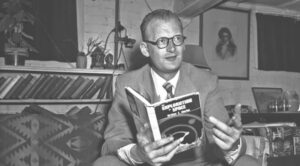
One way of probing how much we have matured in life is to take our former idols down from their pedestals.
As I explain in my autobiography, seeing 2001: A Space Odyssey on the big screen at ten was a transformative experience. In later years I would become a huge fan of Arthur C. Clarke, who under Kubrick’s direction wrote the novel of the same title. In my twenties I would read Clarke’s Childhood’s End: a novel that would greatly influence my worldview. I even corresponded with Clarke. His typewriter letters I showed, incidentally, to the commenter who visited me last month. But now, after taking my vows on the sacred words, I see Clarke as a failed creature and would like to explain why.
The first disillusionment with Clarke occurred when I was living in Houston. I never understood why Clarke had spent most of his life in Sri Lanka, formerly Ceylon. In a bookstore, I saw that Neil McAleer’s biography of Clarke had just been published. I rushed to buy it. Since I put dates on every chapter I read, I know that it was 8 May 1996 when I underlined these paragraphs on page 291:
Clarke knew this unique travelling educational program had great value for students; he believed in it enough to give a scholarship for one student. Says Lloyd Lewan, ‘I remember sitting with him at breakfast one time saying, “Arthur, we have a terrible time coming up with funds to put minorities on the ship.” Of course he wanted to help. The result was he gave us a full scholarship for a minority student—a black woman student from the University of Pittsburgh. He paid for it completely.’
On the first page of my copy of that book, I noted that Clarke had paid a scholarship to that negress instead of paying it to someone like us (someone who would bring the ideals of the movie 2001 into the real world)!
In the third book of my trilogy I talk about who motivated me to love 2001: my father, an uncle and the work of Kubrick and Clarke. In a very brief chapter I note that all of them had betrayed the ideals of my favourite film. Kubrick showed his true Jewish colours after 2001 when he filmed a monstrosity that was released in 1971 (an ultra-violent movie that, fortunately, was banned for many years in the UK, where Kubrick lived). Of my father and uncle I don’t want to talk because they already appear in my autobiography. But about Clarke, I must say a few things.
Yesterday I saw this video by Rob Ager, a film critic, about Clarke’s personal life. Ager lists newspapers claiming that Clarke emigrated to Sri Lanka to have legal sex with Indian teenagers (pederasty is not a crime there). I had already heard these rumours but the amount of evidence that Ager collects is compelling, and motivates me to see my former idol in a different light.
Greco-Roman pederasty, which I’ve discussed on this site—not the optimal form of sexuality, obviously! (though I don’t condemn it)—is one thing. But having sex with Indians is quite another. Such behaviour from someone I used to consider an inspiration disturbs me deeply. Since the early 1980s, the trips I have made to the UK were intended to meet English women, since to my eyes English roses are the most beautiful girls on earth. How a notable Englishman could be incapable of seeing such beauty and go and fuck on the other side of the world with coloureds is an affront to my religion (2001 for example, filmed in England, boasts a couple of very good-looking English actors, a man and a woman).
I know some people say that human beauty is in the eye that sees it, but something inside tells me it is something fairly objective: something like the teleological goal of our universe. When someone I admire is unable to see what I see it disturbs me very deeply, especially if he is an Englishman. Worse, instead of falling in love with an English rose, Clarke became infatuated with his landlord’s son!, as is evident from pages 277-278 of Neil McAleer’s Arthur C. Clarke: The Authorized Biography. When the young Indian died in a motorbike accident, comments an eyewitness, Clarke ‘cried like a baby at the grave and told me, “This is where I will be buried, next to Leslie.” Clarke later named his big house on Barnes Place ‘Leslie´s House’ in memory of his ‘only perfect friend of a lifetime…’
Of course, when I read the book, the authorised biography of Clarke, McAleer didn’t speak openly of pederasty. My disappointment wasn’t complete. Now it is. To go halfway around the world and end up falling in love with a male Indian instead of staying in England and procreating with a beautiful rose, and to boot paying for the career of a young negress, is the ultimate betrayal.
Clarke’s life (1917-2008) is a perfect example of how someone who was born into a very favourable environment, and wrote good science-fiction in the late 1940s—when English values hadn’t yet been grotesquely inverted—, gradually degenerated into a racial traitor. His life is paradigmatic for understanding the West’s dark hour after 1945.